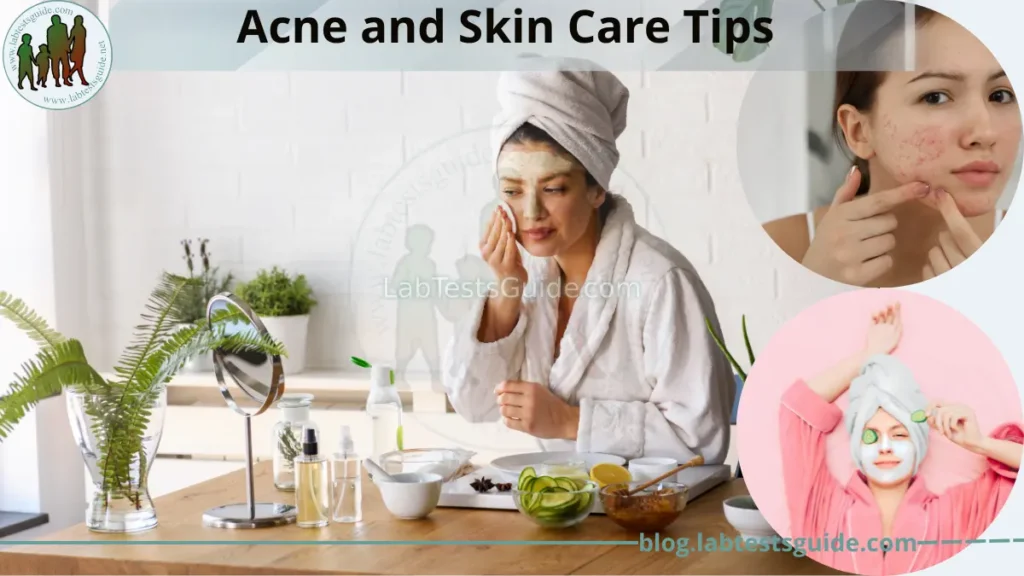Acne and Skin Care Tips: Acne is a common skin condition that affects people of all ages and backgrounds. It is caused by the overproduction of oil and the buildup of dead skin cells, which can clog pores and lead to inflammation and the formation of pimples, blackheads, and whiteheads. Acne can be frustrating and uncomfortable, and it can also have a negative impact on self-esteem and confidence. Fortunately, there are many skin care tips and treatments available to help prevent and control acne breakouts. In this guide, we’ll explore the causes and types of acne, as well as common acne triggers and effective skin care tips for acne prevention and treatment. We’ll also discuss home remedies and professional treatment options for acne scars, as well as tips for keeping skin clear over time.

Acne is a skin condition that occurs when hair follicles become clogged with oil and dead skin cells. Oil and dead skin cells create a plug in the hair follicle, which can lead to the formation of pimples, blackheads, and whiteheads. Acne can occur anywhere on the body, but it is most common on the face, chest, and back.
Acne is a very common skin condition that affects people of all ages and backgrounds. It is estimated that up to 80% of people will experience acne at some point in their lives. Acne is most common during adolescence, when hormone levels rise and the body undergoes many changes. However, it can also occur in adults, particularly women during pregnancy or menopause.
While acne is not a serious health condition, it can have a significant impact on a person’s self-esteem and quality of life. Acne can cause emotional distress, social anxiety, and even depression. Fortunately, there are many skin care treatments and tips available to help prevent and control acne breakouts.
Causes of Acne:
Acne can have a variety of causes.
- Causes of acne Hormonal changes: Hormonal changes during adolescence, menstrual cycles, pregnancy and menopause can contribute to the development of acne. Androgens, male hormones present in both men and women, can cause an increase in sebum production, leading to acne.
- Genetics: Acne can be inherited from parents, which means that if someone in your family has acne, you are more likely to develop it too.
- Poor diet: Diets high in sugar, processed foods, and dairy products have been linked to acne breakouts. Additionally, not consuming enough vitamins and minerals, such as zinc and vitamin A, can also contribute to acne.
- Stress: Stress can trigger the release of hormones that contribute to the development of acne.
- Medications: Certain medications, such as corticosteroids, anticonvulsants, and lithium, can cause acne breakouts.
- Makeup and skin care products: Some makeup and skin care products can clog pores and lead to breakouts. It is important to use non-comedogenic products that do not clog the pores.
- Environmental factors: Exposure to pollutants, humidity, and hot weather can all contribute to the development of acne.
It’s important to note that acne can have multiple causes, and it can be difficult to identify just one trigger. A combination of factors, such as genetics and lifestyle, can contribute to the development of acne.
Types of Acne:
Acne can present in many different forms.
- Whiteheads: Small white bumps that form when a pore becomes clogged with oil and dead skin cells.
- Blackheads: Small black bumps that form when a pore becomes clogged with oil and dead skin cells and the top of the plug is exposed to air.
- Papules: small red bumps that are tender to the touch and do not contain pus.
- Pustules: Red bumps that contain pus and can be painful.
- Nodules: Large, painful bumps that form deep in the skin and can last for weeks or months.
- Cysts: Large, pus-filled lumps that can be very painful and scarring.
Acne can also be classified by its severity: mild acne is characterized by a few occasional pimples, and severe acne is characterized by widespread inflammation and numerous large lesions. Understanding the type and severity of acne is important in developing an effective treatment plan.
Skin Care Tips for Acne Prevention:
Here are some skin care tips for preventing acne.
- Keep your skin clean: Washing your face twice a day with a mild cleanser can help remove excess oil, dirt, and dead skin cells that can contribute to acne.
- Use non-comedogenic products: Non-comedogenic products are designed not to clog pores and can help prevent acne from forming.
- Moisturize: Using a non-comedogenic moisturizer can help keep skin hydrated without clogging pores.
- Avoid touching your face: Touching your face can transfer bacteria, oil, and dirt to your skin, which can lead to breakouts.
- Don’t touch your skin: Touching acne lesions can worsen inflammation and increase the risk of scarring.
- Protect your skin from the sun: Sun exposure can worsen acne and cause hyperpigmentation. Use a non-comedogenic sunscreen with SPF 30 or higher when spending time outdoors.
- Don’t over-wash your skin: Over-washing your skin can strip it of its natural oils, leading to increased oil production and acne.
- Maintain a healthy lifestyle: Eating a balanced diet, getting enough sleep, and managing stress can all contribute to healthy skin and help prevent acne breakouts.
By following these skin care tips, you can help prevent acne from forming and maintain clear, healthy skin.
Skin Care Tips for Acne Treatment:
Here are some skin care tips for treating acne.
- Use a topical acne medication: Topical acne medications, such as benzoyl peroxide or salicylic acid, can help reduce inflammation and unclog pores.
- Don’t overuse acne medications: Overuse of acne medications can irritate the skin, leading to dryness and flaking.
- Spot treatment of acne lesions: Use a targeted spot treatment on individual pimples to help reduce their size and inflammation.
- Avoid abrasive scrubs: Abrasive scrubs can irritate the skin and make acne worse. Instead, use a gentle exfoliant, such as a chemical exfoliator, to remove dead skin cells.
- Wear non-comedogenic makeup: Non-comedogenic makeup can help prevent acne from forming while providing coverage.
- Consider seeing a dermatologist: If over-the-counter treatments aren’t effective, a dermatologist may prescribe a stronger medication or recommend a more specific treatment plan.
- Be patient: Treating acne takes time and patience. It can take several weeks or even months to see improvement.
Remember, everyone’s skin is different, so what works for one person may not work for another. It’s important to find a skin care routine that works for your skin type and acne severity. Be gentle with your skin and don’t be afraid to seek professional help if necessary.
Home Remedies for Acne:
Here are some home remedies for acne.
- Tea Tree Oil: Tea tree oil is a natural anti-inflammatory and antimicrobial agent that can help reduce inflammation and kill bacteria on the skin. Dilute tea tree oil with a carrier oil, such as coconut oil, and apply directly to acne lesions.
- Aloe vera : Aloe vera has anti-inflammatory properties and can help reduce redness and swelling associated with acne. Apply aloe vera gel directly to acne lesions or use a cleanser that contains aloe vera.
- Honey : Honey has antibacterial properties and can help kill bacteria on the skin. Apply raw honey directly to acne lesions and leave on for 10-15 minutes before rinsing.
- Green Tea : Green tea contains antioxidant and anti-inflammatory compounds that can help reduce inflammation and kill bacteria on the skin. Brew a cup of green tea and allow it to cool, then use a cotton ball to apply to acne lesions.
- Apple Cider Vinegar : Apple cider vinegar has antibacterial and anti-inflammatory properties and can help balance the skin’s pH level. Mix equal parts apple cider vinegar and water and apply to the skin using a cotton ball.
- Oats: Oats can help soothe and exfoliate the skin, reducing inflammation and unclogging pores. Mix oats with water to form a paste and apply to skin, massaging gently for 2-3 minutes before rinsing.
It’s important to note that while home remedies may be effective for mild cases of acne, they may not be as effective for severe or persistent acne. If your acne is severe or does not respond to home remedies, it is important to seek professional medical help.
Acne Scarring Treatment Options:
Here are some acne scarring treatment options.
- Chemical Peels: Chemical peels use a chemical solution to remove the outer layer of skin, revealing smoother, more even skin underneath. They can be effective in reducing the appearance of mild to moderate acne scars.
- Microneedling: Microneedling involves the use of a device with tiny needles to create small punctures in the skin. This stimulates collagen production and can help reduce the appearance of acne scars.
- Laser Therapy: Laser therapy uses a laser to remove the top layer of skin, promoting the growth of new, smoother skin. This can be effective in reducing the appearance of moderate to severe acne scars.
- Dermal Fillers: Dermal fillers can be used to fill in depressed or pitted acne scars, creating a smoother skin surface.
- Subcision : Subcision involves the use of a needle to break up the fibrous tissue that is causing a depressed acne scar. This can help lift the scar and make it less noticeable.
- Punch excision: Punch excision involves cutting the scar and sewing the skin back together. This is typically used for small, deep scars.
It is important to note that treating acne scars can be expensive and may require multiple sessions. It is also important to seek a qualified professional for any acne scar treatment, as some treatments can cause further scarring or complications if not done correctly.
Tips for Maintaining Clear Skin:
Here are some tips for maintaining clear skin.
- Wash your face twice a day: Washing your face twice a day with a mild cleanser can help remove dirt, oil, and bacteria that can cause acne. Avoid rubbing your face too vigorously, as this can irritate the skin and make acne worse.
- Use non-comedogenic products: Non-comedogenic products are specifically designed not to clog pores, which can help prevent acne. Look for products that are labeled “non-comedogenic” or “oil-free.”
- Avoid touching your face: Touching your face can transfer oil, dirt, and bacteria from your hands to your skin, which can cause acne. Avoid touching your face, and if you need to touch it, wash your hands first.
- Use sunscreen: Sun exposure can cause inflammation and make acne worse. Use a sunscreen with an SPF of 30 or higher to protect your skin from the sun’s damaging rays.
- Eat a healthy diet: Eating a diet rich in fruits, vegetables, and whole grains can help promote healthy skin. Avoid foods high in sugar or processed foods, as these can contribute to acne.
- Exercise regularly: Exercise can help reduce stress, which can be a trigger for acne. Regular exercise can also help promote healthy blood flow to the skin.
- Get enough sleep: Getting enough sleep is important for overall health, including skin health. Try to get 7 to 8 hours of sleep each night to help your skin look and feel its best.
Remember, everyone’s skin is different and what works for one person may not work for another. If you have problems with acne or other skin problems, it is important to see a professional doctor.
Conclusion:
Acne is a common skin condition that can be frustrating and difficult to control. However, if you understand the causes and types of acne and follow a consistent skin care routine, you can help prevent and treat acne. Also, maintaining healthy habits like eating a balanced diet, exercising regularly, and getting enough sleep can help keep skin clear and healthy. If you are having problems with acne, don’t be afraid to seek professional medical advice. With proper treatment and care, you can achieve clear, healthy skin.






